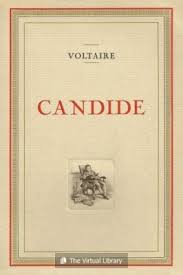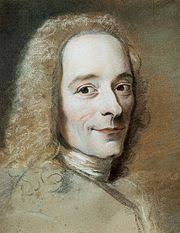Candide Page #13
Candide, ou l'Optimisme, is a French satire first published in 1759 by Voltaire, a philosopher of the Age of Enlightenment.
Cacambo explained this whole discourse with great astonishment to Candide, who was as greatly astonished to hear it. "What sort of a country then is this," said they to one another; "a country unknown to all the rest of the world, and where nature is of a kind so different from ours? It is probably the country where all is well; for there absolutely must be one such place. And, whatever Master Pangloss might say, I often found that things went very ill in Westphalia." XVIII WHAT THEY SAW IN THE COUNTRY OF EL DORADO. Cacambo expressed his curiosity to the landlord, who made answer: "I am very ignorant, but not the worse on that account. However, we have in this neighbourhood an old man retired from Court who is the most learned and most communicative person in the kingdom." At once he took Cacambo to the old man. Candide acted now only a second character, and accompanied his valet. They entered a very plain house, for the door was only of silver, and the ceilings were only of gold, but wrought in so elegant a taste as to vie with the richest. The antechamber, indeed, was only encrusted with rubies and emeralds, but the order in which everything was arranged made amends for this great simplicity. The old man received the strangers on his sofa, which was stuffed with humming-birds' feathers, and ordered his servants to present them with liqueurs in diamond goblets; after which he satisfied their curiosity in the following terms: "I am now one hundred and seventy-two years old, and I learnt of my late father, Master of the Horse to the King, the amazing revolutions of Peru, of which he had been an eyewitness. The kingdom we now inhabit is the ancient country of the Incas, who quitted it very imprudently to conquer another part of the world, and were at length destroyed by the Spaniards. "More wise by far were the princes of their family, who remained in their native country; and they ordained, with the consent of the whole nation, that none of the inhabitants should ever be permitted to quit this little kingdom; and this has preserved our innocence and happiness. The Spaniards have had a confused notion of this country, and have called it El Dorado; and an Englishman, whose name was Sir Walter Raleigh, came very near it about a hundred years ago; but being surrounded by inaccessible rocks and precipices, we have hitherto been sheltered from the rapaciousness of European nations, who have an inconceivable passion for the pebbles and dirt of our land, for the sake of which they would murder us to the last man." The conversation was long: it turned chiefly on their form of government, their manners, their women, their public entertainments, and the arts. At length Candide, having always had a taste for metaphysics, made Cacambo ask whether there was any religion in that country. The old man reddened a little. "How then," said he, "can you doubt it? Do you take us for ungrateful wretches?" Cacambo humbly asked, "What was the religion in El Dorado?" The old man reddened again. "Can there be two religions?" said he. "We have, I believe, the religion of all the world: we worship God night and morning." "Do you worship but one God?" said Cacambo, who still acted as interpreter in representing Candide's doubts. "Surely," said the old man, "there are not two, nor three, nor four. I must confess the people from your side of the world ask very extraordinary questions." Candide was not yet tired of interrogating the good old man; he wanted to know in what manner they prayed to God in El Dorado. "We do not pray to Him," said the worthy sage; "we have nothing to ask of Him; He has given us all we need, and we return Him thanks without ceasing." Candide having a curiosity to see the priests asked where they were. The good old man smiled. "My friend," said he, "we are all priests. The King and all the heads of families sing solemn canticles of thanksgiving every morning, accompanied by five or six thousand musicians." "What! have you no monks who teach, who dispute, who govern, who cabal, and who burn people that are not of their opinion?" "We must be mad, indeed, if that were the case," said the old man; "here we are all of one opinion, and we know not what you mean by monks." During this whole discourse Candide was in raptures, and he said to himself: "This is vastly different from Westphalia and the Baron's castle. Had our friend Pangloss seen El Dorado he would no longer have said that the castle of Thunder-ten-Tronckh was the finest upon earth. It is evident that one must travel." After this long conversation the old man ordered a coach and six sheep to be got ready, and twelve of his domestics to conduct the travellers to Court. "Excuse me," said he, "if my age deprives me of the honour of accompanying you. The King will receive you in a manner that cannot displease you; and no doubt you will make an allowance for the customs of the country, if some things should not be to your liking." Candide and Cacambo got into the coach, the six sheep flew, and in less than four hours they reached the King's palace situated at the extremity of the capital. The portal was two hundred and twenty feet high, and one hundred wide; but words are wanting to express the materials of which it was built. It is plain such materials must have prodigious superiority over those pebbles and sand which we call gold and precious stones. Twenty beautiful damsels of the King's guard received Candide and Cacambo as they alighted from the coach, conducted them to the bath, and dressed them in robes woven of the down of humming-birds; after which the great crown officers, of both sexes, led them to the King's apartment, between two files of musicians, a thousand on each side. When they drew near to the audience chamber Cacambo asked one of the great officers in what way he should pay his obeisance to his Majesty; whether they should throw themselves upon their knees or on their stomachs; whether they should put their hands upon their heads or behind their backs; whether they should lick the dust off the floor; in a word, what was the ceremony? "The custom," said the great officer, "is to embrace the King, and to kiss him on each cheek." Candide and Cacambo threw themselves round his Majesty's neck. He received them with all the goodness imaginable, and politely invited them to supper. While waiting they were shown the city, and saw the public edifices raised as high as the clouds, the market places ornamented with a thousand columns, the fountains of spring water, those of rose water, those of liqueurs drawn from sugar-cane, incessantly flowing into the great squares, which were paved with a kind of precious stone, which gave off a delicious fragrancy like that of cloves and cinnamon. Candide asked to see the court of justice, the parliament. They told him they had none, and that they were strangers to lawsuits. He asked if they had any prisons, and they answered no. But what surprised him most and gave him the greatest pleasure was the palace of sciences, where he saw a gallery two thousand feet long, and filled with instruments employed in mathematics and physics.
Translation
Translate and read this book in other languages:
Select another language:
- - Select -
- 简体中文 (Chinese - Simplified)
- 繁體中文 (Chinese - Traditional)
- Español (Spanish)
- Esperanto (Esperanto)
- 日本語 (Japanese)
- Português (Portuguese)
- Deutsch (German)
- العربية (Arabic)
- Français (French)
- Русский (Russian)
- ಕನ್ನಡ (Kannada)
- 한국어 (Korean)
- עברית (Hebrew)
- Gaeilge (Irish)
- Українська (Ukrainian)
- اردو (Urdu)
- Magyar (Hungarian)
- मानक हिन्दी (Hindi)
- Indonesia (Indonesian)
- Italiano (Italian)
- தமிழ் (Tamil)
- Türkçe (Turkish)
- తెలుగు (Telugu)
- ภาษาไทย (Thai)
- Tiếng Việt (Vietnamese)
- Čeština (Czech)
- Polski (Polish)
- Bahasa Indonesia (Indonesian)
- Românește (Romanian)
- Nederlands (Dutch)
- Ελληνικά (Greek)
- Latinum (Latin)
- Svenska (Swedish)
- Dansk (Danish)
- Suomi (Finnish)
- فارسی (Persian)
- ייִדיש (Yiddish)
- հայերեն (Armenian)
- Norsk (Norwegian)
- English (English)
Citation
Use the citation below to add this book to your bibliography:
Style:MLAChicagoAPA
"Candide Books." Literature.com. STANDS4 LLC, 2025. Web. 22 Jan. 2025. <https://www.literature.com/book/candide_25>.




Discuss this Candide book with the community:
Report Comment
We're doing our best to make sure our content is useful, accurate and safe.
If by any chance you spot an inappropriate comment while navigating through our website please use this form to let us know, and we'll take care of it shortly.
Attachment
You need to be logged in to favorite.
Log In